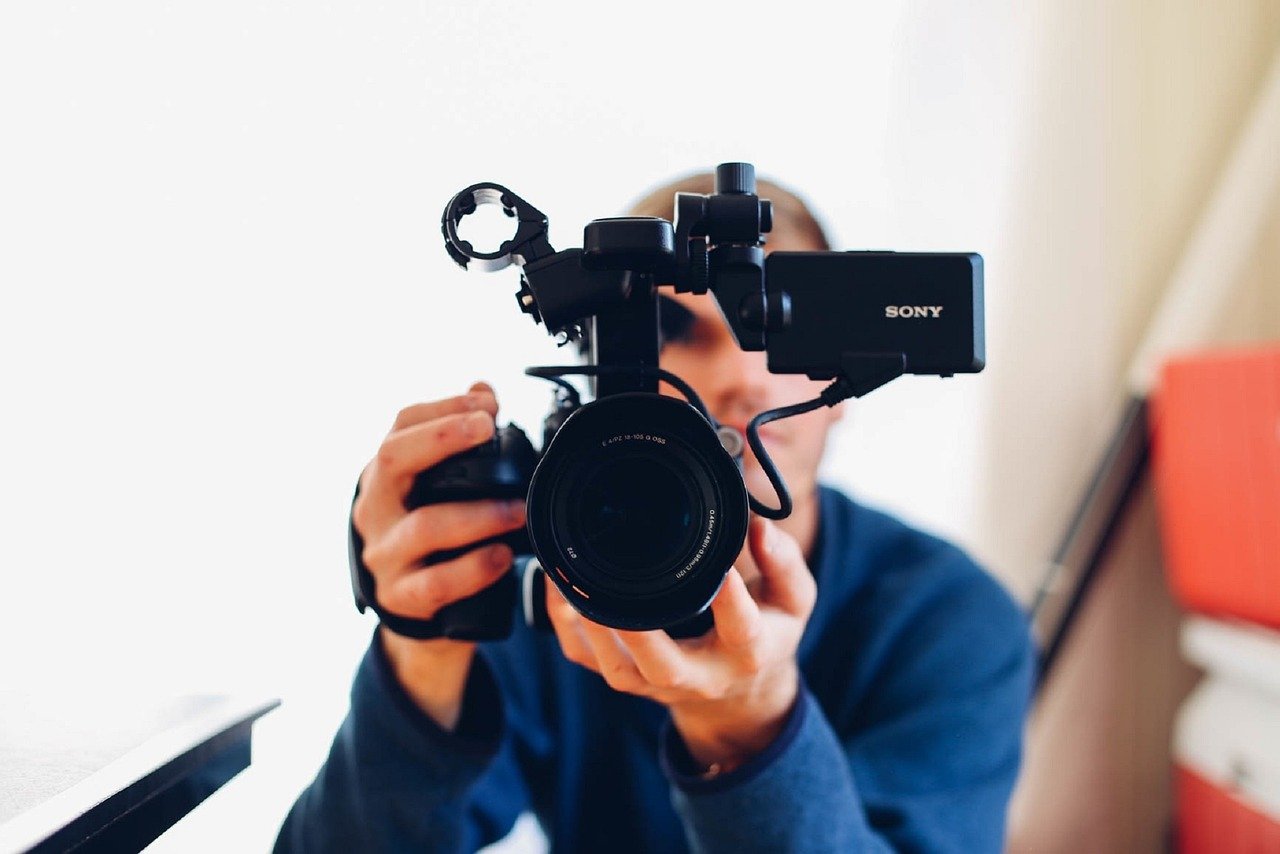Starting Your Freelance Videography Business: Comprehensive Guide to Success In the fast-evolving landscape of digital…
Things You Should Focus on in Videography Training
In today’s visual-centric world, mastering videography has become more than just a hobby; it’s a vital skill for both personal and professional growth. Videography Training plays a crucial role in honing this skill, whether you’re looking to start a career or improve your craft. This guide will explore various aspects of videography training, including online courses, hands-on workshops, and advanced specialized training.
Videography Courses and Training
Why You Need Videography Training
Investing in videography training is essential for anyone serious about improving their video production skills. Training provides structured learning and hands-on experience, offering insights into both technical and creative aspects of videography. It can help you understand camera settings, lighting, composition, and editing techniques, leading to higher-quality videos and greater career opportunities.
Types of Videography Training Available
There are several types of training to consider, each catering to different learning preferences and goals:
- Online Courses
- Film Schools
- YouTube Tutorials
- Hands-On Workshops
- Certifications
- Mentorship Programs
- Community Colleges
- Technical Schools
- Specialized Training
Best Online Videography Courses
Top Platforms for Online Learning
Online learning has revolutionized education by making it accessible and flexible. For videography training, platforms like Udemy, Coursera, and MasterClass offer extensive courses tailored to various skill levels. These courses often include video tutorials, assignments, and quizzes to reinforce learning.
Key Features to Look For
When choosing an online course, focus on the following features:
- Instructor Expertise: Ensure the instructor has substantial industry experience.
- Course Reviews: Look for positive feedback from previous students.
- Practical Assignments: Courses with hands-on projects provide better learning opportunities.
Film School vs. Self-Taught
Pros and Cons of Film School
Attending a film school offers a formal education, structured curriculum, and professional networking opportunities. However, it can be expensive and time-consuming. Film schools like the American Film Institute or NYU Tisch offer comprehensive programs that cover all aspects of filmmaking and videography.
Advantages of Self-Taught Methods
Being self-taught allows for a more flexible and personalized learning experience. You can tailor your studies to specific interests and learn at your own pace. Resources like online tutorials, books, and forums can provide valuable knowledge and practical skills without the high cost of traditional education.
YouTube Tutorials for Videographers
Benefits of YouTube Tutorials
YouTube is a fantastic resource for free videography training. It offers countless tutorials on various aspects of videography, from basic camera techniques to advanced editing. The visual nature of these tutorials helps in understanding complex concepts more easily.
Recommended Channels and Playlists
Here are some top YouTube channels that provide excellent content for videographers:
- Peter McKinnon: Offers insights into creative techniques and gear reviews.
- Film Riot: Focuses on DIY filmmaking tips and tricks.
- DSLR Video Shooter: Provides tutorials on camera gear and shooting techniques.
Hands-On Workshops

What to Expect from Workshops
Hands-on workshops are an excellent way to gain practical experience. These workshops often involve real-world scenarios where you can apply what you’ve learned in a controlled environment. They also offer opportunities to receive feedback from instructors and peers.
Finding Local Workshops
To find local workshops, check community centers, universities, and film schools. Additionally, networking within local videography communities can help you discover workshops tailored to your interests and skill level.
Videography Certifications
Importance of Certification
Certification can enhance your credibility and showcase your expertise in videography training. It often involves passing a rigorous exam or completing a comprehensive course. Certifications from reputable organizations can make your resume stand out to potential employers.
Popular Certification Programs
- Adobe Certified Expert (ACE): Validates your skills in Adobe software.
- Certified Professional Photographer (CPP): While not exclusively for videographers, it covers relevant aspects of professional imaging.
Mentorship and Apprenticeships
How Mentorship Enhances Skills
Mentorship provides personalized guidance from experienced professionals. A mentor can offer career advice, technical tips, and industry insights that are invaluable for your growth. They can also help you build a professional network and provide opportunities for real-world experience.
Finding the Right Mentor
Seek mentors through industry events, professional associations, and networking platforms. Look for someone whose work aligns with your interests and whose experience can help you achieve your career goals.
Community Colleges and Technical Schools
Advantages of Local Institutions
Community colleges and technical schools offer affordable and practical videography training. They often have smaller class sizes, allowing for more personalized attention and hands-on learning.
Top Community Colleges for Videography
- Los Angeles City College: Known for its strong film and video production programs.
- New York Film Academy: Offers a range of programs focusing on various aspects of filmmaking and videography.
Advanced Videography Training
What Constitutes Advanced Training?
Advanced training delves into more complex areas of videography, such as cinematography, advanced lighting techniques, and high-level editing. This training is ideal for those looking to specialize or elevate their skills to a professional level.
Best Resources for Advanced Learners
Look for advanced courses, industry workshops, and conferences that offer in-depth training on specialized topics. These resources can provide cutting-edge techniques and insights into emerging trends in videography.
Specialized Training (e.g., Drone, Underwater)

Importance of Specialized Training
Specialized training is crucial for mastering niche areas of videography. Whether you’re interested in drone footage or underwater filming, specialized courses provide the specific skills and knowledge required for these unique areas.
Leading Providers of Specialized Courses
- Drone Pilot Ground School: Offers comprehensive training for drone operation.
- PADI: Provides certification for underwater videography.
Editing Software Training
Key Editing Software to Master
Mastering editing software is essential for creating high-quality videos. Key programs include Adobe Premiere Pro, Final Cut Pro, and DaVinci Resolve.
Where to Get Training for Editing Software
Many online platforms offer courses focused on these editing tools. Look for courses that cover both basic and advanced features to ensure a thorough understanding of the software.
Cinematography Courses
Difference Between Videography and Cinematography
While videography focuses on recording video content, cinematography is about the art of visual storytelling. Cinematography courses delve deeper into composition, lighting, and camera movement.
Best Cinematography Courses
- American Film Institute: Offers in-depth cinematography programs.
- Skillshare: Provides a variety of cinematography classes online.
Sound Design Training
The Role of Sound Design in Videography
Sound design is crucial for creating immersive video experiences. It involves creating and manipulating audio elements to enhance the overall impact of your videos.
Where to Learn Sound Design
Consider courses on platforms like LinkedIn Learning and specialized sound design schools to develop your skills in this area.
Lighting Workshops
Importance of Lighting in Videography
Proper lighting is essential for achieving the right mood and clarity in your videos. It affects how your subjects appear and can dramatically impact the quality of your footage.
Top Lighting Workshops to Consider
- American Society of Cinematographers: Offers workshops on lighting techniques.
- Local Film Schools: Often provide specialized lighting workshops.
Scriptwriting for Videographers
How Scriptwriting Enhances Videography
A well-written script is the backbone of any successful video project. It provides structure and direction, ensuring your videos convey the intended message effectively.
Courses and Resources for Scriptwriting
Look for scriptwriting courses and books that cover story structure, dialogue, and screenplay format. These resources will help you create compelling scripts for your videography projects.
Post-Production Training
The Post-Production Process
Post-production involves editing, color correction, sound design, and more. It’s a crucial phase where the final polish is applied to your video.
Essential Training for Post-Production Skills
Enroll in courses that cover various aspects of post-production, including editing software, color grading, and sound design.
Business Courses for Videographers
Why Business Skills Matter for Videographers
Understanding business fundamentals can help you manage your videography career or business more effectively. This includes skills in marketing, client relations, and project management.
Recommended Business Courses
Look for courses focused on freelance management, marketing for creatives, and business planning to enhance your business acumen.
Videography Books and Resources
Must-Read Books for Aspiring Videographers
Books can provide in-depth knowledge and inspiration. Some recommended titles include “The Visual Story” by Bruce Block and “In the Blink of an Eye” by Walter Murch.
Online Resources and Guides
Explore blogs, eBooks, and industry websites to stay updated on the latest trends and techniques in videography.
Networking and Industry Events
The Value of Networking
Networking is vital for building professional relationships and finding opportunities in the videography industry. Attending events and joining industry groups can help you connect with other professionals and potential clients.
Key Industry Events to Attend
- Cine Gear Expo: A major event for film and video professionals.
- NAB Show: Offers insights into the latest technology and trends.
Online Communities and Forums

Benefits of Online Communities
Online communities and forums provide a platform for sharing knowledge, asking questions, and connecting with other videographers. They can be valuable for feedback and support.
Popular Forums for Videographers
- Reddit’s r/videography: A community for discussing videography topics.
- Creative COW: A forum for professionals in film and video.
Continuous Learning and Development
Importance of Lifelong Learning
The field of videography is constantly evolving, and staying updated with new techniques and technologies is crucial for ongoing success.
Ways to Keep Skills Updated
Engage in continuous learning through workshops, online courses, and industry events. Regularly practicing and experimenting with new techniques will also help keep your skills sharp.
Conclusion
Investing in videography training is a powerful way to enhance your skills and advance your career. From online courses and hands-on workshops to specialized training and business courses, there are numerous options to suit your needs and interests. By exploring these avenues, you can gain valuable knowledge, practical experience, and a competitive edge in the field of videography.
FAQs
What are the best online videography courses?
Some of the best online courses include those offered by Udemy, Coursera, and MasterClass. Look for courses with high ratings and comprehensive content.
How does film school compare to self-taught methods?
Film school provides formal education and networking opportunities but can be costly. Self-taught methods offer flexibility and cost-effectiveness but require more self-discipline and resourcefulness.
Where can I find hands-on workshops for videography?
Check community centers, universities, and film schools for local workshops. Networking within videography communities can also help you discover valuable workshops.
What are the benefits of certification in videography?
Certification can enhance your credibility, demonstrate your expertise, and improve your job prospects. It’s a valuable addition to your resume.
How can I continue learning and developing my videography skills?
Engage in continuous learning through online courses, workshops, and industry events. Stay updated with new techniques and regularly practice to keep your skills sharp.




